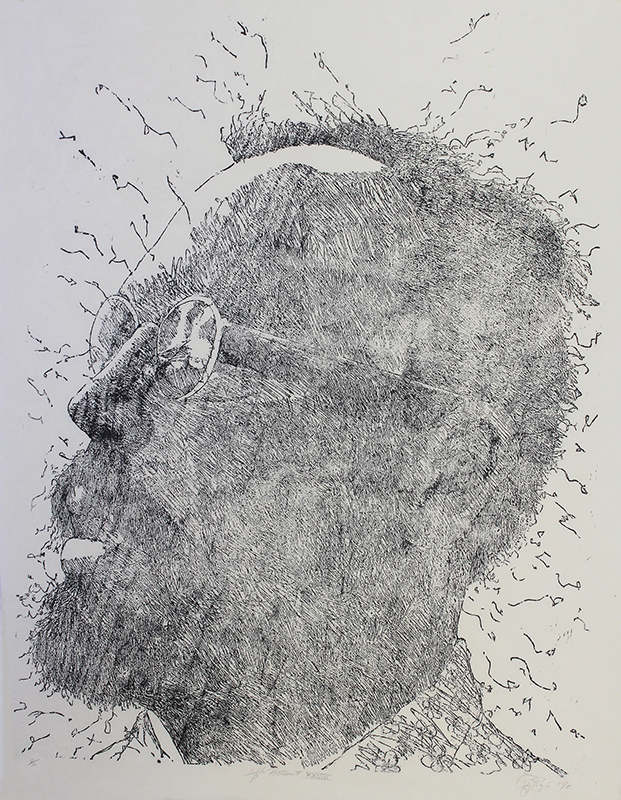
19th, 20th & 21st Century Fine Prints
707-546-7352 · fax 707-546-7924 · web: www.annexgalleries.com · email: artannex@aol.com
Self-Portrait XXVII by Roy W. Ragle

Self-Portrait XXVII
Roy W. Ragle
Self-Portrait XXVII
Roy W. Ragle
1944 - 2014 (biography)Roy Ragle had a successful career exhibiting his astonishingly detailed and often very large woodcut portraits. This self-portrait was done in 1973, his 29th year. Ragle's work was mostly sold to private collectors or donated to public collections around the country and were seldom sold in the retail market. His self portraits over the years were a personal record of his on-going battle with Crohn's Disease.
Ragle's work was often mistakenly labelled as lithography or intaglio in exhibitions because many curators could not believe that his fluid, spidery line work could come from the typically rigid woodcut form.
This print is printed relief, meaning that the white areas were cut away and the remaining surface lines were inked and printed, both of which involved great care, concentration and skill. Ragle incorporated the grain of the woodblock into the center of this composition.
Roy Ward Ragle was born on December 8, 1944 in San Diego, California. He had begun his MFA program at San Diego State University (SDSU) before being drafted into the U.S. military in 1970. While in the military he was diagnosed with Crohn's disease.
Ragle went on to a successful career exhibiting his astonishingly detailed and very large woodcut portraits. His work was often mistakingly labelled as lithographs or etchings in exhibitions because no one believed that his fluid, spidery line work could come from the rigid woodcut form. His mastery of craft was matched by the psychological perception of his subjects, which more often than not included himself, as he described the harrowing affects of the disease on his physiognomy.
Ragle’s work obsessively turned to his medical condition and his own mortality. “Self Examination Series” was his final large scale woodcut print, a triptych portrait of himself, his wife, and his doctor dancing with skeletons. His later imaginary portraits were created by making a foil mask of the sitter, then crushing it (by walking over it with his crutches as support) and embossing an image onto paper which he then slowly and painstakingly brought to light with a fine pen and his own darkly spirited vision. The results were death portraits in the underworld. Ragle passed these off as true portraits and labelled them, “Crossing the River Styx Series” in his beautiful and wordy handwritten titles.
Throughout the 1980s his work was exhibited in print competitions, community art galleries and museum survey exhibitions. But his increasingly poor health finally caused his doctor to order him out of the studio in the late-1980s.
The endless rounds of hospitalizations and the darkening vision of his artwork caused him to withdraw from the art world. Over the course of the last twenty years his work has appeared infrequently with a rare one person exhibition at the Fetterly Gallery in Vallejo in 2000 and at the now defunct Collector’s Gallery at the Oakland Museum in 2005.
Roy Ragle died on December 11 in San Francisco, California, 2014, three days after his 70th birthday.
